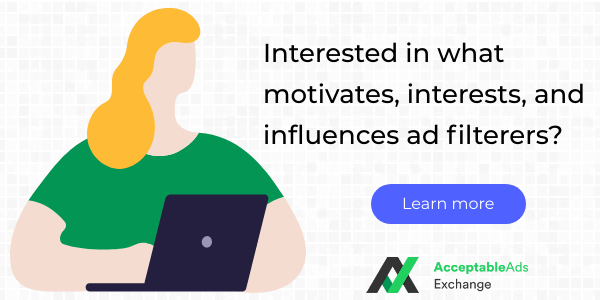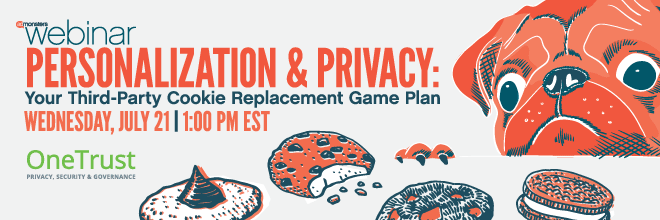| Research Finds Targeted Ads Miss the Mark |

Photo by Ricardo Arce on Unsplash
|
| Talk about a plot twist. Adalytics, a browser extension that analyzes the effectiveness of ads a person sees, found that targeted advertising is, in fact, quite off. And not just slightly. Merino shoes, for example, served 90.5% of its gender-based ads to the wrong gender. A male user was shown ads for bridesmaids' footwear from Keds and women’s wedding tennis shoes. Ads geared toward medical professionals (like doctors or researchers) ended up being served to people who don’t even work in the medical field. Talk about missing the mark. |
| Perhaps saying goodbye to third-party cookies and focusing more on first-party data isn’t such a bad thing after all. Where’s the silver lining if less than 10% of a brand’s ads are going to the right audience? Studies like this might be the proverbial kick in the pants that publishers and advertisers sorely need. Or maybe not. One does have to wonder: If ad targeting doesn't work, then why does it feel like they're stalking you? Cookies did their job, but the industry is long overdue for other options. With a surge in traffic to cookieless environments, like mobile and CTV, we're already seeing how important it is for both buyers and sellers to invest in first-party data and alternatives to the 3P cookie. Isn't it time we find out how advertising can be truly useful to advertisers and publishers, as well users? |
| Global Privacy Control Must Be Honored By All Websites |
| News on the streets is that the California AG is now requiring that all companies adhere to opt-out requests sent via Global Privacy Control (GPC), a tool developed by privacy advocates enabling website visitors to opt-out of the sale of their data on a universal basis. The tool was launched back in October as a means of informing users when their data has been cataloged by websites and then provides them with the option of opting out of their personal information being resold to a third party. As of now, both Chrome and Safari each use their own proprietary privacy protection tools and have not enabled GPC. |
| When there are too many cooks in the kitchen, the left-hand doesn’t know what the right hand is doing. It's not like publishers don't want to be respectful of an individual's opt-out requests. But with no universal option, and various states launching their own versions of privacy regs, implementing changes can get costly—especially for smaller pubs. Picture spending five figures on updating your site to comply with one rule, only to have a different rule call for different requirements months later? It sounds like an industry-standard is becoming more necessary. And, spoiler alert, The ANA, 4As, the IAB, and AAF are not on board with GPC. Given that not all browsers comply with GPC it sort of leaves the onus on pubs to ensure that they're complying with every regulation (and required technology) that comes down the pike. It's times like these that a thoughtful national privacy law — that doesn't favor big tech over digital publishers — sounds like it could be a godsend. |
 |
| How Has Ad Blocking Changed Since 2017? | ||
| 2017 was only four years ago—but it was, in so many ways, a different era. We’ve seen a lot of changes. To remember 2017 isn’t merely to think back to a time before COVID-19, but also recall a moment in time when Donald Trump was a newly elected president, the #MeToo movement hadn’t yet begun, and the American reckoning with racism that defined 2020 was still to come. In 2017 TikTok was only a phenomenon in mainland China, Greta Thunberg was an unknown student in Sweden, and the streaming revolution was in its infancy. Our question: amid all this upheaval, as history was being made before our eyes and our lives moved more online than ever before, how did our relationship with ad blocking change? AAX delved into the treasure trove of data GlobalWebIndex (GWI) keeps on internet use of all varieties. We wanted, specifically, to examine the reasons why ad filterers block ads—both now and back in 2017. (Ad filterers are defined by the GWI as “users who have blocked ads in the past month but discover brands or products through ads seen online and have clicked on an online ad in the past month.”) The most notable change since 2017 is an overall decrease in affirmative answers when users were asked “Why do you use an ad blocker?” For example, 61.3% of respondents said that they blocked ads because “Too many ads on the internet are annoying or irrelevant” back in 2017, compared to only 57% in 2020. This downward trend continued nearly across the board. But there was one outlier. When asked why they used an adblocker, 18.7% of ad filterers in 2020 replied “I want to stop my data allowance from being used up,”—up from 16.2% in 2017. This underlines a pattern we’ve observed since 2017. More and more ad blocking is now occurring on mobile devices, where data and data allowances is a subject of paramount concern. |
||
| Ad blocking users tend to have their collective fingers on the pulse. This 200 million-strong demographic is composed of highly educated, affluent digital natives, and their motivations often reflect larger cultural shifts ahead of time. That’s one reason why AAX is fascinated with ad blocking users, and why we penned our last study Why Block Ads? Behind User Reasons and Motivations. | ||
|
||
| Big Brands Acquiring Ad Tech at Lightning Speed |
| We know 2021 has been the year of ad tech IPOs, ad tech SPACs, ad tech M&As, but did we also realize that it's the year of advertiser/ad tech M&As? Large brands like Nike, Neiman Marcus, and Yum Brands (parent company to Pizza Hut, KFC, and Taco Bell) are taking the future of the cookieless world into their own hands and buying up martech and ad tech companies to shore up first-party data collection and customer knowledge. "The mass formula for retail no longer works. You have to be able to leverage personalized relationships," said Bob Kupbens, chief product and technology officer of Stylyze, recently acquired by Neiman Marcus. |
| It looks like brands aren't playing when it comes to improving their first-party data and prepping for the inevitable demise of the 3P cookie. They want to know more about their customers and they want to know now. Instead of counting on DSPs to lay down the cookieless pipes for them, they're bringing their own ad tech in-house. In 2020, we saw the Pandemic give a few brands a much-needed nudge towards setting up self-serve ad platforms to capture SMB spend, improve workflows, and firm up first-party data. The motto was adapt or die. In 2021 this feels somewhat different. Companies know that cookies are fleeting and they're trying to get as ahead of this future as possible. These M&As are a direct result of this mindset. We expect the trend will continue with full force. |
| Around the Water Cooler |
| Here's what else we've been reading and thinking about... Colorado Passes ColoPA Privacy Regs The Colorado Privacy Act (ColoPA) now joins VCDPA and the CCPA/CPRA as comprehensive privacy legislation. Like the others, ColoPA provides consumers with rights for access, deletion, correction, portability, and opt-out for targeted advertising, sales, and certain profiling decisions that have legal or similar effects. And this regulation will come with a universal opt-out signal that must be complied with by July 1, 2024. IBM Watson Wants to Use AI to Uncover and Reduce Bias in Advertising We first got wind of this news some weeks back, but just last week heard IBM SVP Worldwide Ecosystems Bob Lord discuss IBM's research study in full detail on Bloomberg TV, where he explained how AI can be used to look at segmentation results to rule out biases. He also talked about there no longer being a need for walled gardens and how predictive tech can protect consumer privacy as well as give brands the best way of reaching consumers. Ad targeting is already inherently biased, and perhaps the cookieless era will push the advertising ecosystem to make it less so. |
 |
||||
|
||||
 |
||||
|
||||
 |
||||
|
| @{optoutfooterhtml}@ |









